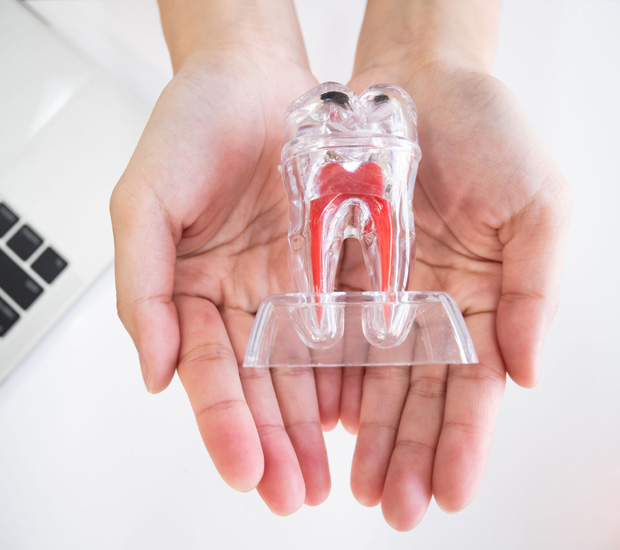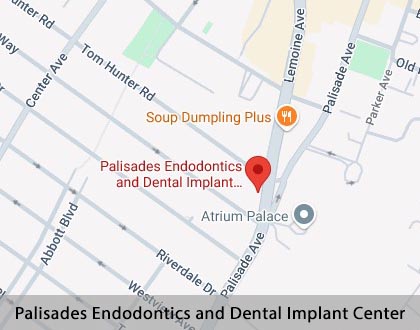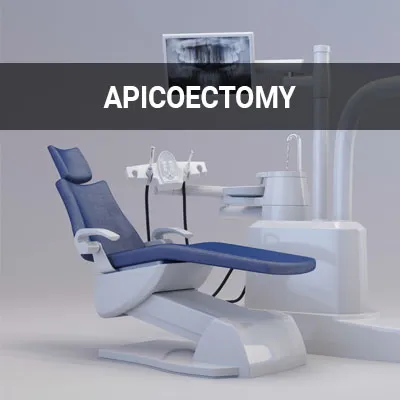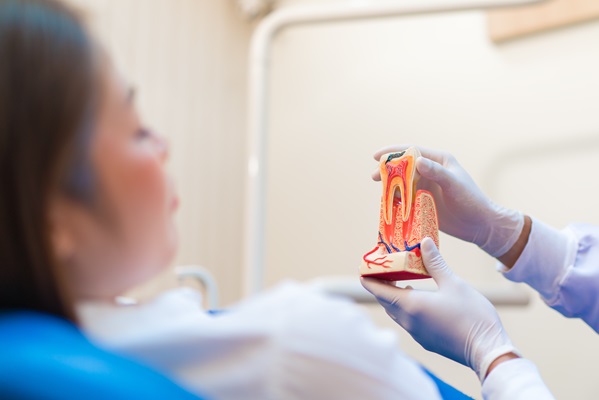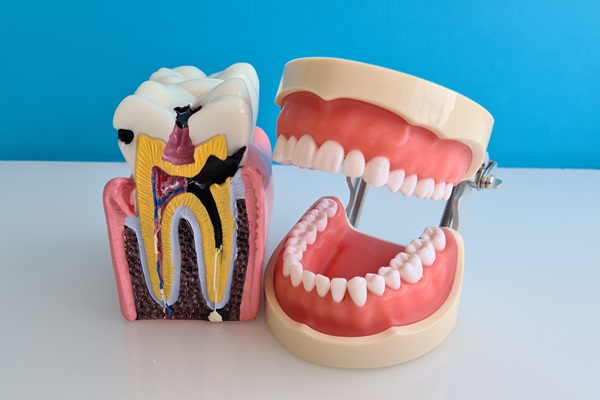Regenerative Endodontic Treatment Fort Lee, NJ
With regenerative endodontic treatment, biologically-based materials can stimulate a damaged tooth's natural healing process. For many patients, it is the perfect alternative to more invasive, traditional root canal therapy. If you have a tooth in need of repair, regenerative endodontic treatment may be right for you.
Regenerative endodontic treatment is available at Palisades Endodontics and Dental Implant Center in Fort Lee and the surrounding area. Let us help stimulate your body's natural healing process. Call us today at (201) 877-1190 to schedule an appointment or learn more about our services.
The Anatomy of a Tooth
Endodontics is a specialty branch of dentistry concerning the dental pulp and tissues surrounding the tooth roots. The dental pulp is also known as the connective tissue at the center of a tooth. It lies beneath the layer of dentin, and it comprises multiple types of cells, such as fibroblasts, histiocytes, macrophages, mast cells, odontoblasts, and plasma cells.
Within the dental pulp are blood vessels, connective tissues, and nerves that provide the tooth with the necessary nutrients to function optimally. These are also responsible for forming dentin, the calcified tissue that protects the tooth pulp. Though dental pulp is vital to healthy tooth development, it becomes unnecessary once a tooth has fully matured. A mature tooth with infected pulp can be saved by removing the pulp.
“Within the dental pulp are blood vessels, connective tissues, and nerves that provide the tooth with the necessary nutrients to function optimally.”
What Is Endodontic Treatment?
Endodontic treatment aims to repair tooth tissues while treating various causes of tooth pain at the root. The end goal with endodontic treatment is always to save a patient's natural tooth. Unfortunately, despite technological advances, no tooth replacement option can look, feel, or function as well as a natural tooth. Endodontists, therefore, are specially trained in addressing problems that affect the tooth pulp. For example, they may treat pulp or root tissues damaged from abscess, injuries, tooth decay, or a crack that extends to the pulp tissue.
A reversible case of pulpitis may be treated with a simple filling, while irreversible pulpitis may indicate a need for a root canal treatment. Endodontic treatment can also resolve issues of pulp necrosis, an irreversible condition in which the dental pulp dies, often as a result of chronic pulpitis. Such an issue can eventually lead to a dental abscess, which can spread throughout the body. Abscesses may also be potentially life-threatening. Again, root canal treatment can help.
“Endodontic treatment aims to repair tooth tissues while treating various causes of tooth pain at the root.”
What Is Regenerative Endodontic Treatment?
According to the American Association of Endodontists (AAE), regenerative endodontics is "one of the most exciting developments in dentistry today." Thankfully, endodontists get to play a key role in this vanguard technology. By using the concept of tissue engineering to "restore the root canals to a healthy state," regenerative endodontics allows for continued development of the root and surrounding tissue.
Furthermore, endodontists can also employ their knowledge in pulp biology, dental trauma, and tissue engineering to bring forth biologically based regenerative endodontic treatment of necrotic immature permanent teeth. This may result in:
- Apical closure
- Continued root development
- Increased thickness in the dentinal walls
Such developments are promising in the efforts to retain the patient's natural dentition and save the teeth, which we had earlier established is the main goal of all endodontic treatment.
“…endodontists can also employ their knowledge in pulp biology, dental trauma, and tissue engineering to bring forth biologically based regenerative endodontic treatment of necrotic immature permanent teeth.”
Check out what others are saying about our dental services on Yelp: Regenerative Endodontic Treatment in Fort Lee, NJ
What Happens in a Regenerative Endodontic Treatment?
As many types of regenerative endodontic treatment procedures have been suggested, it is crucial to understand the most-used procedure. According to one 2015 article published in Restorative Dentistry & Endodontics, the AAE suggests that regenerative endodontic treatment can be used for teeth with necrotic pulp, an immature apex, and pulp space unnecessary for post and core. The tooth is first anesthetized and isolated with a rubber dam to create an access opening. It is then adequately and gently irrigated with sodium hypochlorite.
The root canal will also be dried with sterile paper points, and we will apply the antimicrobial medicament into the canal space. We will also disinfect the canal space with a triple antibiotic paste. Once the medicament has been applied, we will seal the tooth with a temporary filling and schedule the patient for a follow-up appointment in three to four weeks. At the second appointment, we will evaluate the patient for any signs and symptoms of an acute infection. Once it has been confirmed that no signs exist, we will move on to the next step of treatment.
“As many types of regenerative endodontic treatment procedures have been suggested, it is crucial to understand the most-used procedure.”
Questions Answered on This Page
Q. What is the anatomy of a tooth?
Q. What is the end goal of endodontic treatment?
Q. What can regenerative endodontic treatment do?
Q. What is the most common regenerative endodontic treatment procedure?
People Also Ask
Q. What are the symptoms of a tooth infection?
Q. What are signs that someone needs a root canal?
Q. What are the symptoms of an abscessed tooth?
Q. Why would a person need an apicoectomy?
Frequently Asked Questions
Q. What happens during the second regenerative endodontic treatment appointment?
A. As previously mentioned, once we have established that there are no signs or symptoms of infection, we will begin the next phase of treatment. We will then remove the temporary filling and clean the inside of the tooth. We will also induce bleeding inside the tooth to create a blood clot, and we will take other steps to encourage the growth of new tissue inside the tooth. We will then seal the tooth with a permanent filling.
Q. Can patients of all ages benefit from regenerative endodontic treatment?
A. As of this moment, regenerative endodontic treatment has been used most widely with children, as their teeth roots and tissues continue to grow and develop. This makes it easier to revitalize them, especially if they see an endodontist as soon as possible. However, regenerative endodontic treatment can certainly benefit adults as well.
Q. Is regenerative endodontic treatment effective?
A. Yes. Regenerative endodontic therapy is very effective. However, it does have certain limitations. For instance, it requires the hand of an incredibly skilled professional. It may also cause tooth discoloration if done incorrectly. We will do everything in our power to make your treatment as seamless as possible.
Q. What is the difference between regenerative endodontic treatment and root canal therapy?
A. Regenerative endodontic treatment can be thought of as an extension of traditional root canal therapy. Root canal therapy uses artificial materials to clean and fill the dental pulp chamber. This prevents further damage and tooth loss. In contrast, regenerative endodontic treatment replaces diseased pulp with live tissues in the pulp chamber. This enables the tooth to regenerate itself and restore its functioning.
Q. What is vital pulp therapy?
A. Traditional root canal treatments remove the pulp completely. In contrast, vital pulp therapy intends to keep injured or infected tooth pulp alive. Therefore, it may be necessary for the patient to undergo several treatments to remove the damaged or infected part of the pulp, protect the remaining pulp from any more trauma, and stimulate the growth of new pulp.
Start Feeling Better – Visit Us Today
By visiting us as soon as possible, our team can help get you the professional treatment you need. Instead of waiting around and allowing the symptoms to get worse, we can provide you with treatment options.
Definitions
Call Us Today
Regenerative endodontic treatment can stimulate your natural healing process. We at Palisades Endodontics and Dental Implant Center can help. Call us today at 201-877-1190 to schedule an appointment or learn more about our services.
Helpful Related Links
- American Association of Endodontists. Regenerative Endodontics. 2024
- BMC Oral Health. Regenerative endodontic procedures. 2024
- Decisions in Dentistry. Introduction to Regenerative Endodontics. 2024
- Frontiers in Dental Medicine. Regenerative Endodontic Procedures in Immature Permanent Teeth With Dental Trauma. 2024
- International Endodontic Journal. Regenerative endodontics: a comprehensive review. 2024
- MDPI. Regenerative Endodontics as the Future Treatment of Immature Permanent Teeth. 2024
- Nature. Expert consensus on regenerative endodontic procedures. 2024
- NIH: National Library of Medicine. A review of the regenerative endodontic treatment procedure. 2024
About our business and website security
- Palisades Endodontics and Dental Implant Center was established in 1997.
- We accept the following payment methods: American Express, Cash, Check, Discover, MasterCard, and Visa
- We serve patients from the following counties: Bergen County
- We serve patients from the following cities: Fort Lee, Palisades Park, Leonia, Edgewater, Ridgefield, Englewood, Tenafly, and Alpine
- National Provider Identifier Database (1124100102). View NPI Registry Information
- Norton Safe Web. View Details
- Trend Micro Site Safety Center. View Details
Back to top of Regenerative Endodontic Treatment
